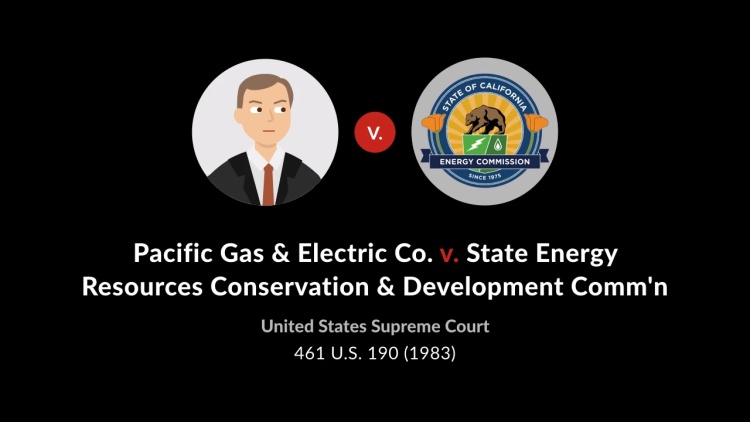Pacific Gas & Electric Co. v. State Energy Resources Conservation & Development Commission
United States Supreme Court
461 U.S. 190 (1983)
- Written by Megan Petersen, JD
Facts
The State of California passed the Warren-Alquist Act to help regulate the storage and disposal of nuclear waste. Section 25524.1(b) of the act provided that before a nuclear power plant could be built, the State Energy Resources Conservation and Development Commission (state commission) (defendant) had to determine on a case-by-case basis that there would be “adequate capacity” for interim storage of the plant’s spent fuel at the time the plant required that storage. Section 25524.2 of the act imposed a moratorium on the certification of new nuclear plants until the state commission found that there was a demonstrated technology or means, approved by the United States through its authorized agency, for permanently disposing of high-level nuclear waste. Pacific Gas & Electric Co. (PG&E) (plaintiff), a nuclear-power producer, filed suit in federal district court seeking to enjoin enforcement of the California regulations. PG&E alleged that the regulations were preempted under the Supremacy Clause of the Constitution by the Atomic Energy Act of 1954 (AEA). The district court held that both § 25524.1(b) and § 25524.2 were preempted by the AEA. The appellate court reversed and held that § 25524.1(b) was not ripe for review and that § 25524.2 was ripe for review but was not preempted by the AEA. The United States Supreme Court granted certiorari.
Rule of Law
Issue
Holding and Reasoning (White, J.)
Concurrence (Blackmun, J.)
What to do next…
Here's why 910,000 law students have relied on our case briefs:
- Written by law professors and practitioners, not other law students. 47,100 briefs, keyed to 997 casebooks. Top-notch customer support.
- The right amount of information, includes the facts, issues, rule of law, holding and reasoning, and any concurrences and dissents.
- Access in your classes, works on your mobile and tablet. Massive library of related video lessons and high quality multiple-choice questions.
- Easy to use, uniform format for every case brief. Written in plain English, not in legalese. Our briefs summarize and simplify; they don’t just repeat the court’s language.





